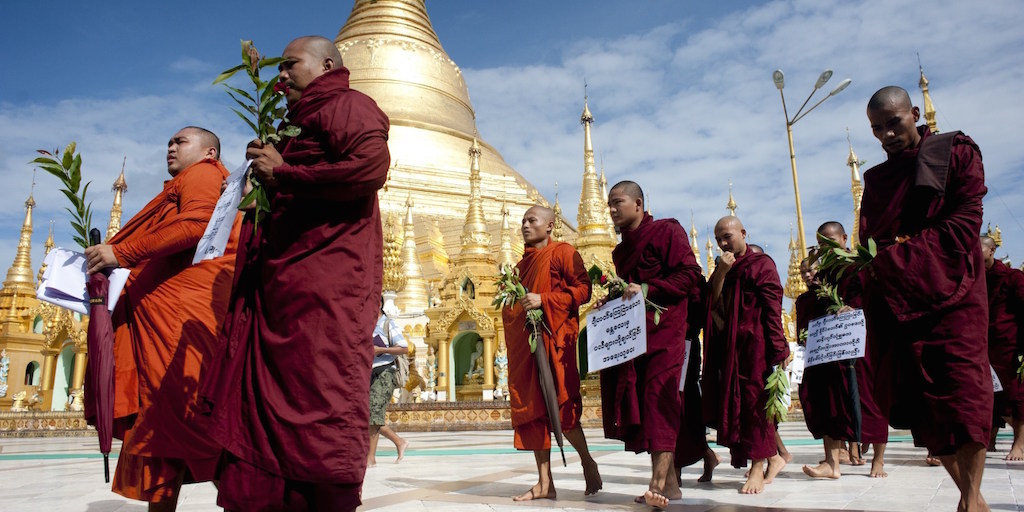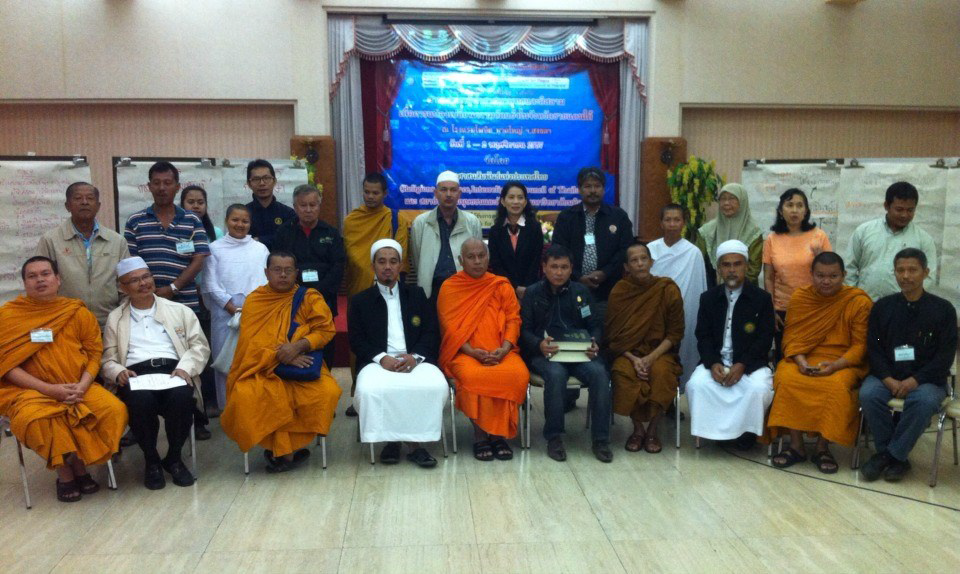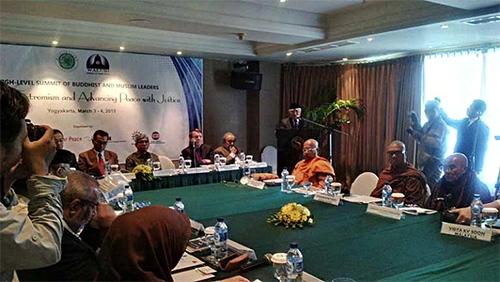In recent years, we have heard much about the importance of mutual tolerance and non-discrimination on the part of religious believers and communities. But somehow, the practical reality of achieving this tolerance has been erratic or even absent altogether, evidenced by cases of torture, thrashing, execution, and the destruction of cultural heritage in many countries. Today, communal violence is a particular concern for religious minorities in South and Southeast Asian countries like Bangladesh, Myanmar, and Sri Lanka. To promote peace in modern society, interfaith dialogue is essential in order to foster positive communication and cooperation between different religions and cultures. Understanding the values of communal harmony, Buddhist and Muslim leaders in South and Southeast Asia are now working together in the recognition that to stop violence means to promote peace.
To further this aim, from 3–4 March this year a high-level summit titled “Overcoming Extremism and Advancing Peace with Justice” was held in Yogyakarta, Indonesia. Sponsored by the International Forum on Buddhist-Muslim Relations (BMF), the summit was hosted by the Indonesian Buddhist Association and the Indonesian Council of Ulama and attended by Buddhist and Muslim leaders from 15 countries. In conclusion, they released the “Yogyakarta Statement,” which reaffirmed that “Islam and Buddhism are religions of mercy and compassion committed to justice for all humankind” and that both traditions “respect the sacredness of life and inherent dignity of human existence, which is the foundation of all human rights without any distinction as to race, color, language, or religion.” They also called on all states to “take measures to fulfill their responsibilities to protect their citizens from religious and racial hatred, and incitement to discrimination and violence in the name of religion” (International Network of Engaged Buddhists).
The participants further reaffirmed shared fundamental values in the two religions’ respective scriptures and canonical treatises, under such themes as “Religious Diversity and Peaceful Co-Existence,” “Universal Mercy and Compassion,” “Universal Justice,” “Human Dignity and Non-Violence,” “Living in Harmony with the Environment,” “Pluralism, Tolerance, and Religious Freedom,” and “Rejection of Hate, Hate Speech, Retaliation, and the Importance of Self-Introspection.”
Based on these themes, the leaders made a commitment to enhance social and religious collaboration in order to foster multicultural and multiethnic identity for the benefit of all. They agreed to reinforce BMF to: a) serve as a platform for intra-religious and inter-religious initiatives in education & advocacy; b) enable rapid reaction/solidarity visits/early warning/conflict prevention in the event of conflict; c) develop and provide tools and materials for constructive engagement and strategic common action; and d) develop the effective use of media for positive messaging, particularly via social & alternative media (International Network of Engaged Buddhists).
The Huffington Post quoted Reverend Kyoichi Sugino, the deputy secretary general of Religions for Peace International, an interfaith NGO, as saying, “The statement is currently being translated into local languages and will be disseminated to senior, mid- and grassroots-level Buddhist and Muslim leaders and believers, women and youth groups.”
Any existing communal harmony between Buddhists and Muslims in Bangladesh, Sri Lanka, and Myanmar has been erased in the last few years. For example, in September 2012, the antecedents and repercussions surrounding the incidents of violence at Ramu in Bangladesh negatively affected the balance of peace and security both in Bangladesh and in neighboring Myanmar. Although the Ramu violence is attributed to a perceived insult to Islam, there were other contributing factors underlying the force of the reaction. Firstly, the minority Rohingya Muslims living in Myanmar have long been oppressed by the majority Myanmar Buddhists, causing a build-up of religious tension in the area. Secondly, minority Muslims have often been victimized in other countries in the region such as Sri Lanka, with hard-line Buddhists targeting Muslims and Christians alike.
Shapan Adnan, a professor in the School of Area Studies at Oxford University, summed up his view of the causes of the Ramu violence thus: “Destruction of Buddhist temples and homesteads by Bengali Muslims at the end of September 2012 in Ramu of south-eastern Bangladesh appears to have been partly linked to the ongoing violence on Muslim Rohingyas across the border in Burma by Rakhaine Buddhists and Burmese security forces. These attacks in Ramu also reflect extension of pre-existing communal violence on non-Muslim (Buddhist, Hindu, Christian and animist) ethnic minorities in the adjoining Chittagong Hill Tracts (CHT) of Bangladesh by Bengali Muslims and security forces, which have been going on for more than three decades” (Oxford University).
According to The Huffington Post, the president of the Sri Lanka Council of Religions for Peace, Bellanwila Wimalaratana Anunayaka Thera, who was among the Sri Lanka representatives at the summit, affirmed that violence should not be perpetrated in the name of religion. “We reject such abuse and pledge to counter extremist religious interpretations and action with our authentic primary narratives of peace,” he said. The Jakarta Post also reported him as saying: “We also recognize the need to strengthen governmental measures against religiously motivated discrimination and violence.”
Chandra Muzaffar, a Malaysian academic and social activist, offered, “If we want peace and justice, it is very important for Buddhists and Muslims to come together because these are two major world religions” (The Jakarta Post).
Unfortunately, we hear all too often of politically motivated acts of violence justified in the name of Islam in Muslim-dominated countries such as Bangladesh, Afghanistan, and Pakistan. There is therefore nothing surprising about Islamic fundamentalists playing the role of mass organizers, policy-makers, and the main actors in ethnic cleansing, or sectarian and communal violence. In Myanmar, it is also unfortunate that some religious masters have played a significant role in instigating violence against the Rohingya Muslim minority. It is also not surprising to observe that currently, in many countries communal conflict occurs not only between different religious communities, but even within the same religion. However, it is also true and equally fair to say that the majority of the religious clergy is contributing to the promotion of communal equilibrium by teaching spiritual doctrines of peace and understanding.
To promote peace in society, there needs to be more virtuous religious practitioners than preachers. Understanding the values of communal harmony, we should continue interfaith dialogue until communal harmony is established.
In conclusion, two famous sayings are quoted here from the “Yogyakarta Statement”:
Islam: “ . . . if anyone slays a human being, . . . it shall be as though he had slain all humankind; whereas, if anyone saves a life, it shall be as though he had saved the lives of all humankind” (The Qur’an, 5:32).
Buddhism: “Whoever settles a matter by violence is not just. The wise calmly considers what is right and what is wrong. Whoever guides others by a procedure that is nonviolent and fair is said to be a guardian of truth, wise and just” (Dhammapada, 256–57).
For more information, see:
Buddhist, Muslim Leaders Push For Peace In Conflict Areas (The Huffington Post)
Yogyakarta Statement – Buddhist Muslim Summit (International Network of Engaged Buddhists)
Muslim, Buddhist leaders denounce religious strife (The Jakarta Post)
Buddhist-Muslim Meeting Pushes for Peace (Regional Interfaith Network)
Religious and Ethnic Violence in Bangladesh and Burma (Oxford University)














